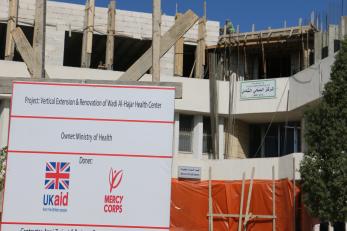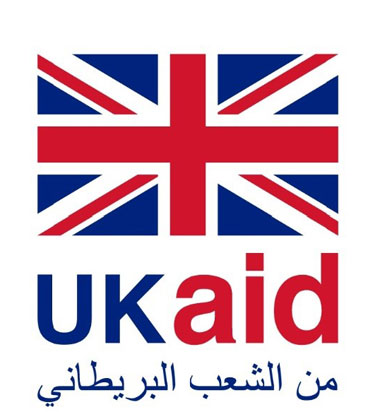Mercy Corps collaborates with the Ministry of Health to support the health system in Jordan during COVID-19

Globally, health systems have been challenged by the overwhelming demands of the COVID‑19 pandemic. Resources and staff are being redirected to test and provide treatment for confirmed and potential cases of COVID‑19. The Jordanian Ministry of Health has been working hard to ensure hospitals are ready to welcome COVID‑19 cases.
Across the globe, the fight against the Coronavirus has overstretched health systems and is damaging economies. In Jordan, the Ministry of Health announced to turn the majority of its budget allocations to respond to the COVID‑19 pandemic. While necessary, it also risks diverting funding away from other priorities such as providing sustainable health services, improving their quality, and supplying health facilities with their needs of medical and non-medical devices, supplies and furniture.
In 2013, Mercy Corps launched the Leadership and Community Development program funded by the United Kingdom (UKaid) where Mercy Corps worked to improve the infrastructure of the local communities. Since the beginning of the pandemic, this program has supported the government in responding to the current COVID‑19 crisis and its direct or indirect long-term effects.
Mercy Corps, in close coordination with Foreign, Commonwealth and Development Office the Ministry of Health and other actors in the health sector, worked to identify the priorities that can be supported by Mercy Corps. Consequently, approximately 1.5 million Jordanian dinar of the program budget was allocated to rehabilitation of health infrastructure, providing medical equipment and providing furniture and supplies to health centers.
The support provided by Mercy Corps will help improve the capacity of the ministry to respond to a diversity of medical needs, including those affected by COVID‑19 (either directly or indirectly), and will help in enhancing the quality of the services provided in the targeted health centers and hospitals.
Health sector priorities that will be supported by Mercy Corps can be summarized in three key aspects:
Aspect 1- Rehabilitation and maintenance projects
As the improvement and enhancement of the infrastructure is considered a basis to support the continuation and sustainability of health services, maintenance in two health centers will be implemented in order to enhance the quality of services provided and contribute to its durability and continuity. The health centers are:
- Al Ashrafyeh health center in Irbid
- Southern Shouneh Health center
Improving hospital facilities and raising the readiness of hospitals to confront the Coronavirus requires equipping hospitals with specialized facilities for medical staff. Accordingly, preparing and furnishing adequate dormitories for medical staff in hospitals was identified as part of the prioritized projects in the following locations:
- Al-Basheer Hospital
- Doctor Jameel Al-Toutanji Hospital
- Karak hospital
- Maan Hospital
Aspect 2- Providing medical equipment to health centers and hospitals
Due to the reallocation of the 2020 budget, the ministry faced challenges in financing the equipping of health centers and hospitals that face shortages in some equipment. Therefore, supplying medical equipment was recognized as one of the top priorities, and Mercy Corps started the procurement of different medical equipment such as hemodialysis units, digital X-Ray, dental units, general and other laboratory devices and equipment. These will be distributed to 25 health centers and hospitals across the country before the end of March 2021.
Aspect 3- Providing medical and non-medical furniture and supplies to different locations
The Ministry of Health emphasized the need to adequately furnish health centers and hospitals in order to enable medical staff to provide quality medical services. Mercy Corps started the procuring of medical and non-medical furniture and supplies that will be distributed to 20 health centers and hospitals across the country before the end of March 2021.
This program is funded by the Foreign, Commonwealth and Development Office (FCDO) (UKaid) and implemented by Mercy Corps - Jordan.
Funded by FCDO
